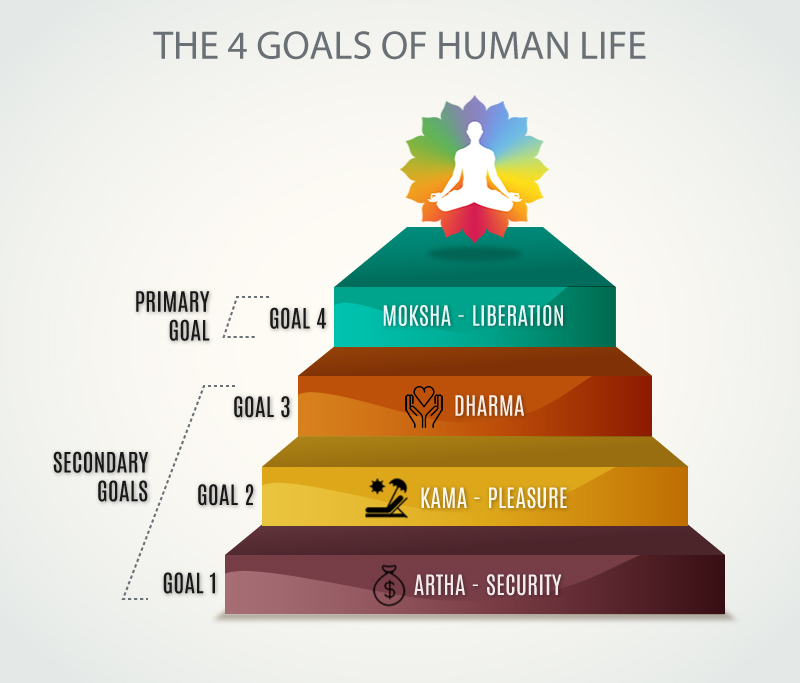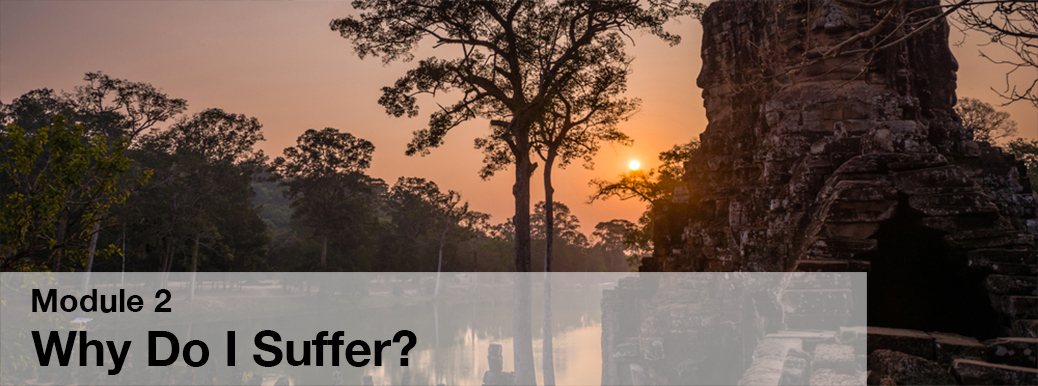Introduction
“Human goals” is translated into Sanskrit as Purushartha. “Purushartha” is a combination of two words; “Purusha” and “Artha”. The word “Purusha” in this context means a human being. The word “Artha” has several different meanings in Sanskrit. One meaning is “Wealth”, another is “Security”; however in this context it refers to a “Goal”.
So Purushartha means human goals.
The 4 human goals are:
- Artha (Security)
- Kama (Pleasure)
- Dharma (Ethics)
- Moksha (Liberation)
These 4 goals can be divided into two sets. The first set, Artha (Security) and Kama (Pleasure) is pursued by all living beings. The second set, Dharma (Ethics) and Moksha (Liberation) is peculiar to humans.
The specific purpose in saying Purusha (Human) is to convey the meaning that these 4 goals collectively are sought after only by humans, not by other living beings. Because of the availability of Purushartha, humans become different than animals and plants.

The Reason for Purushartha in Humans
The differentiating factor is the faculty of thinking, the intellect (Buddhi). Humans are capable of judgement, reasoning, reminiscing about the past, projecting into the future and planning one’s actions.
This extra faculty of the intellect has a negative side-effect as well. It makes us self-conscious, we become self-judgmental. We develop a complex when we compare ourselves with others.
If we suffer from an inferiority complex, we try to better ourselves in future. So planing for the future becomes a natural consequence of the thinking faculty.
Only humans are capable of these tendencies. Animals and plants live a life based on pre-programmed instincts. Whereas a human life is governed not only by instincts, but also by free will, by the capacity to choose their own future. And because of this capacity of choice, humans entertain lot of goals and these are called Purushartha (human goals).
1. Artha – The Endless Search for Security
Even animals and plants seek some form of security. Animals seek shelter, hoard food, a dog buries its bone, a bee fills a honeycomb with honey. So even animals have a sense of insecurity.
However animal behaviour is governed by a built-in program, instincts. Their sense of insecurity is contained, limited, it has an end point. They don’t endlessly brood over security.
For humans, on the other hand, there is no end point. There is no end to the sense of want. The endlessness of human struggle to fulfill their wants can be seen by analyzing experiences.
If I seek money, no matter how much I accumulate, it never seems enough. The sense of inadequacy never leaves me; I never feel secure. I constantly struggle to create more wealth for myself.
If I seek security through power and influence, I spend money to gain power, the same money I so struggled to acquire. I now spend money not because I have lost value for it, but because I now attach a higher value towards power. I am now seeking security through power.
This struggle to feel secure by pursuing wealth, power, influence and fame is endless.
2. Kama – The Mercurial Nature of Pleasure
It’s the next stage after Artha (Security). When a person feels reasonably secure, and if he or she has the means, they pursue pleasure (Kama) based on their likes and dislikes.
Animals also seek pleasures and comforts. However their pursuit is guided by instincts and pre-programmed behaviour. Their enjoyment is not complicated by self-judgement.
A dog or a cat eats until it is full, not concerned by health or aesthetics. Enjoyment begins, ends, and is contained in the moment. There is no prior planning, and no reminiscing afterwards.
Human Pursuit is More Complex
Every person lives in his or her own subjective world, where some objects are desired, some undesired, and others considered neutral.
When I examine my likes and dislikes closely, I find that my attitude towards objects is not consistent. What I desire today, is not desired by me at all times, or at all places.
I also find that objects desired by me are not considered desirable by everyone else. They hold a special value only to me. My desires keep changing. My desires are also time and place dependent.
The Garage Sale Example
In a garage sale, I sell off to others what I once considered valuable. These objects hold no value to me today, but are valuable to others. Similarly what others consider worthless, I find valuable.
Sometimes things which one has sold off as junk is now again considered valuable because circumstances or attitudes have changed.
Shifting Values Keep us Struggling
Everything in our life is subject to becoming desirable, undesirable or neutral. Old cars, old houses, old furniture, even wives and husbands, go from one status to another.
This interchange goes on all the time. Subjective values, our likes and dislikes, do not remain the same.
Likes and dislikes dictate the pleasures we seek, and what we want to avoid. Part of seeking pleasure is avoiding what causes displeasure.
Both humans and animals struggle to obtain the pleasant, and avoid the unpleasant. The difference is that the human struggle is not determined by any set pattern, but dictated by fluctuating values. These constantly changing values keeps us ever-struggling.
3. Dharma – Ethics
The human goal of Dharma can be thought of as an invisible form of wealth. It manifests in our life in the form of good fortune or good luck, and contributes to our well being. The benefits can be in the form of either Artha (Security) or Kama (Pleasure).
The religious ethics called Dharma are found in the Vedas. The Vedas specify various “do’s and dont’s”, the results of which are in the form of Punya (merit) and Papa (demerit).
According to the rules of Dharma, human action has an immediate tangible result and an unseen result. The unseen result accrues in subtle form to the account of the “doer” of the action. And in time, this result will manifest as either a “good” or “bad” experience in the life of the “doer”, something pleasurable or painful.
Punya and Papa
If the action had been bad, breaking the norms of Dharma, the subtle result is Papa (demerit), which manifests as a “bad” or painful experience in this life or a future one.
Papa can also be defined as sin. Sin is the choice of a wrong goal or a wrong means in the pursuit of an acceptable goal. This choice of action will bring an undesired result – the very result that the doer wanted to avoid in the first place.
We pay for our Papa in the form of undesirable experiences. There’s no better encouragement to follow Dharma than to avoid the consequences of Papa.
There’s no good English word for Punya. It just means that the unseen result of “good” actions will bring a desirable experience for you in future.
Ranking of the 4 Human Goals
Dharma occupies the first place in the four categories of human goals, because the pursuit of security (Artha), and the pursuit of pleasure (Kama), needs to be governed by ethical standards (Dharma).
Artha, striving for security, comes second because the foremost concern of any living being is security. Once a person is reasonably secure, he starts seeking comforts and pleasure, so Kama (pleasure) comes third .
Moksha, the goal of liberation, comes last because one pursues Moksha only when the limitations inherent in the first three pursuits is realized.
4. Moksha – Liberation or Freedom
Moksha is inner freedom, freedom from slavery or attachment to Dharma, Artha and Kama.
The pursuits of Dharma, Artha and Kama, are based on the sense that “I am insecure, I am unhappy, I am mortal, I must become somebody.” As a limited person, I must fulfill my urge to become bigger and better than I now take myself to be.
How can this urge be fulfilled? By more Dharma, Artha and Kama.
I must realize that simply adding more Dharma, Artha and Kama will not alter my basic sense of limitation.
The Broomstick Example
Now stand back and admire the broomstick. What do you see?
A broomstick! A decorated and bejeweled broomstick it maybe, but it’s still just a broomstick.
A person who sees this example as a description of his own experience seeks Moksha.
How Does One Become A Slave to Dharma-Artha-Kama
Some objects like money create problems by both their presence and absence.
Moksha – The ultimate human goal
When things are absent, I do not feel limited. And when things are present, they do not create a strain on me. Moksha means being okay, with or without, Dharma-Artha-Kama. This inner strength, inner maturity, inner mastery is called Moksha.
The first three (Dharma-Artha-Kama) are secondary goals, while the last one (Moksha) is the primary goal of human life. In the former slavery continues, while in Moksha alone one is no longer a slave of anything.
Summary
| 1. | The four human goals are Artha (Security), Kama (Pleasure), Dharma (Ethics) and Moksha (Liberation). |
| 2. | Artha stands for all forms of security in life like wealth, power, influence and fame. Humans try to feel secure by pursuing wealth, power and influence. |
| 3. | Kama stands for all forms of sensual pleasure like food, travel, sex and music. |
| 4. | A person desires keep changing. What I desire now, may not be desired tomorrow, or may be desired only in specific situations. These constantly changing desires keeps us ever-struggling. |
| 5. | According to the rules of Dharma every human action has a tangible immediate result and an unseen subtle result. If an action follows the norms of Dharma, the subtle result is Punya or merit. And if the action is not in keeping with Dharma, the subtle result is Papa or demerit. |
| 6. | This unseen result, Punya, will manifest in future as a positive or favourable experience. And Papa will manifest as a negative or painful experience. |
| 7. | Since Punya is achievable by action, it also becomes a human goal. So Dharma is also a human goal. The pursuit of Artha and Kama are governed by Dharma. |
| 8. | The 4th and highest human goal is Moksha. Moksha is liberation or freedom from attachment to Dharma, Artha and Kama. |


